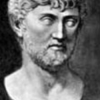Lucretius

Lucretius
Titus Lucretius Caruswas a Roman poet and philosopher. His only known work is the epic philosophical poem De rerum natura about the tenets and philosophy of Epicureanism, and which is usually translated into English as On the Nature of Things...
NationalityRoman
ProfessionPoet
atheism world
There is so much wrong with the world. (tanta stat praedita culpa)
fighting mind atheism
Forbear to spew out reason from your mind, but rather ponder everything with keen judgment; and if it seems true, own yourself vanquished, but, if it is false, gird up your loins to fight.
fall lasts stones
Falling drops will at last wear away stone.
mother stars flower
Mother of Rome, delight of Gods and men, Dear Venus that beneath the gliding stars Makest to teem the many-voyaged main And fruitful lands- for all of living things Through thee alone are evermore conceived, Through thee are risen to visit the great sun- Before thee, Goddess, and thy coming on, Flee stormy wind and massy cloud away, For thee the daedal Earth bears scented flowers, For thee waters of the unvexed deep Smile, and the hollows of the serene sky Glow with diffused radiance for thee!
views light littles
So, little by little, time brings out each several thing into view, and reason raises it up into the shores of light.
born
Nothing from nothing ever yet was born.
light lovely without-you
You alone govern the nature of things. Without you nothing emerges into the light of day, without you nothing is joyous or lovely.
bears want humans
Do we not see all humans unaware Of what they want, and always searching everywhere, And changing place, as if to drop the load they bear?
eye men hands
And since the mind is of a man one part, Which in one fixed place remains, like ears, And eyes, and every sense which pilots life; And just as hand, or eye, or nose, apart, Severed from us, can neither feel nor be, But in the least of time is left to rot, Thus mind alone can never be, without The body and the man himself, which seems, As 'twere the vessel of the same- or aught Whate'er thou'lt feign as yet more closely joined: Since body cleaves to mind by surest bonds.
race mind body
For common instinct of our race declares That body of itself exists: unless This primal faith, deep-founded, fail us not, Naught will there be whereunto to appeal On things occult when seeking aught to prove By reasonings of mind.
self body void
All nature, then, as self-sustained, consists Of twain of things: of bodies and of void In which they're set, and where they're moved around.
spring air body
When bodies spring apart, because the air Somehow condenses, wander they from truth: For then a void is formed, where none before; And, too, a void is filled which was before.
forever doubt body
But yet creation's neither crammed nor blocked About by body: there's in things a void- Which to have known will serve thee many a turn, Nor will not leave thee wandering in doubt, Forever searching in the sum of all, And losing faith in these pronouncements mine.
blow cells inward
...Nature allows Destruction nor collapse of aught, until Some outward force may shatter by a blow, Or inward craft, entering its hollow cells, Dissolve it down.